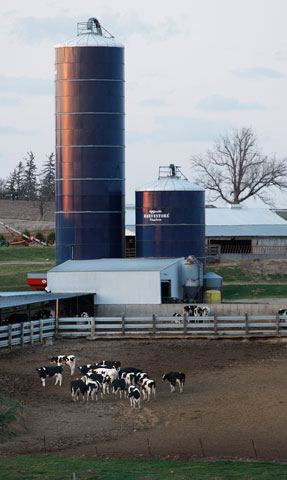
Cows graze near a silo in 2009 on a farm at sunset just outside Postville, Iowa. The partisan battles over cutting the current federal budget are likely to factor into what the 2013 farm bill will look like. (CNS/Bob Roller)
Expecting a delayed farm bill to finally go through Congress before June, advocates -- among them four Catholic entities in a joint letter -- are reminding representatives of their priorities as a bill is being hashed out.
In a May 9 letter to Sens. Debbie Stabenow, D-Mich., and Thad Cochran, R-Miss., the chairwoman and ranking member, respectively, of the Senate Agriculture Committee, the Catholic groups outlined domestic hunger, international food security, conservation, rural development and subsidies as key issues to be treated in a farm bill.
The organizations -- the U.S. Conference of Catholic Bishops, the National Catholic Rural Life Conference, Catholic Charities USA and Catholic Relief Services -- seek cuts in crop subsidies, but preservation and enhancement to their other priority areas.
“We ask that you support a farm bill that provides for poor and hungry people both at home and abroad, offers effective support for those who grow our food, ensures fairness to family farmers and ranchers, and promotes stewardship of the land,” read the letter.
It was signed by Bishop Richard Pates of Des Moines, Iowa, chairman of the bishops’ Committee on International Justice and Peace; Bishop Stephen Blaire of Stockton, Calif., chairman of the bishops’ Committee on Domestic Justice and Human Development; CRS President Carolyn Woo; Fr. Larry Snyder, president of Catholic Charities USA; and James Ennis, executive director of the rural life conference.
Seven Catholic groups were also among more than 100 national organizations asking Congress to keep from weakening the Supplemental Nutrition Assistance Program (SNAP), known colloquially as food stamps.
“SNAP reaches the neediest and most vulnerable people in our country. The average household has an income of only 58.5 percent of the federal poverty level and 83 percent of all benefits go to households with a child, senior, or disabled person,” the groups said in a May 6 letter.
The signers of that letter included the bishops’ conference, the rural life conference, the Catholic social justice lobby NETWORK, the National Advocacy Center of the Sisters of the Good Shepherd, the Viatorians’ Provincial Council, the Sisters of Charity of Nazareth, and the Institute Justice Team of the Sisters of Mercy of the Americas.
The foundation of a farm bill had its origins in bipartisan deficit-reduction talks in late 2011, but the bipartisan “supercommittee” of House and Senate members could not come to a final agreement on an overall federal debt-cutting framework, thus scuttling the farm bill.
Work last year on the bill was hampered by the absence of Congress from Washington for long stretches of the year due to campaigning during the presidential election year.




